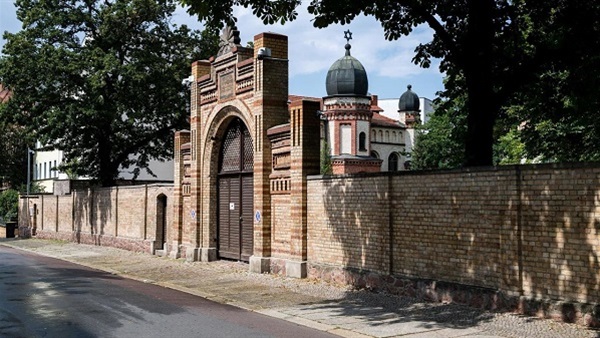German man goes on trial for deadly Halle synagogue shooting

A German man is to go on trial for a deadly shooting
targeting Jews in the eastern city of Halle last year, one of the worst acts of
antisemitic violence in Germany’s postwar history.
Stephan Balliet, 28, is accused of shooting dead two
people in October after he tried and failed to storm a synagogue. He has been
charged with two counts of murder and multiple counts of attempted murder.
Prosecutors say Balliet used explosives and firearms
to try to gain access to the synagogue, where 52 worshippers were celebrating
Yom Kippur, the holiest day in the Jewish calendar.
After failing to break through the locked wooden
door, he shot dead a female passerby and a man in a nearby kebab shop. He
filmed the assault and livestreamed it on the internet.
The attack shocked Germany and fuelled alarm about
rising rightwing extremism and anti-Jewish violence, 75 years after the end of
the Nazi era.
The German chancellor, Angela Merkel, who attended a
vigil at a Berlin synagogue after the attack, said the bloodshed in Halle
showed Germany had “to do more” to protect Jewish people.
Prosecutors in the trial, which begins on Tuesday,
said Balliet made a “very comprehensive” confession, confirming “far-right and
antisemitic motives”.
Balliet published documents online that called for
the killing of all Jews.
His video of the attack will be shown in court.
Balliet faces an additional charge of incitement to hatred for denying the
Holocaust in the footage.
According to a report in Der Spiegel magazine, a
psychological assessment of Balliet concluded he had a complex personality
disorder with elements of autism. However, he was deemed to be aware of his
actions and not exempt from criminal responsibility, the report said.
Baillet “described the fatal shots fired at his two
victims in Halle without emotion” and appeared disappointed he had failed in
his attempt to enter the synagogue, Norbert Leygraf, a psychiatrist, was cited
as saying.
The trial is being held at the district court in
Magdeburg and is scheduled to last until mid-October. If convicted, Baillet
could face life in prison.
The synagogue’s door, which still bears the bullet
holes from the assault, is to be removed and used for a communal art project.
President Frank-Walter Steinmeier, regarded by many
as Germany’s moral compass, said in his Christmas speech last December it was
“a miracle” the door had resisted the attack, saving dozens of lives.
“It also symbolises what we stand for. Are we strong
and resistant? Do we stand by each other enough?” he said.
The Halle attack came three months after the murder
of the local pro-migrant politician Walter Lübcke in the western city of
Kassel, allegedly by a known neo-Nazi.
The trial in that case began last month, with
prosecutors claiming the 46-year-old suspect, Stephan Ernst, was motivated by
“extreme rightwing political convictions”.
In February, a gunman with apparent far-right
beliefs killed nine people at a shisha bar and a cafe in the city of Hanau,
near Frankfurt.
The interior minister, Horst Seehofer, has since
declared far-right extremism the “biggest security threat facing Germany”, and
promised to strengthen the security response.







